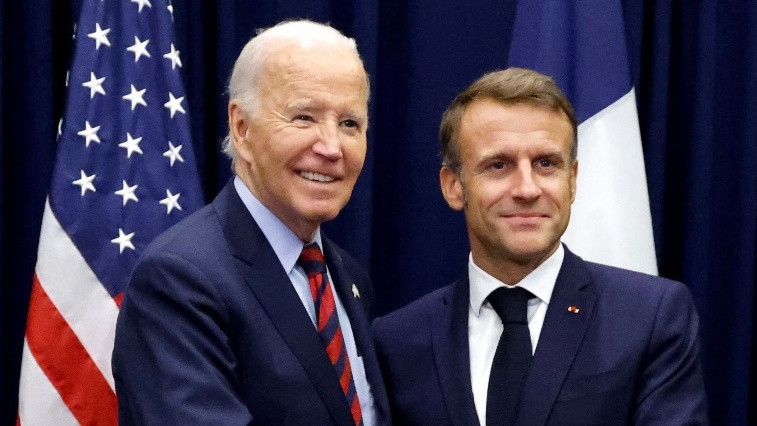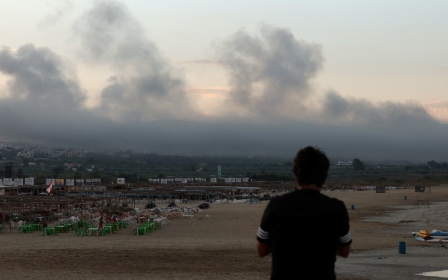Israel's war on Lebanon: Western mediators are disconnected from reality

Since last October, Israel and Hezbollah have been engaged in a war of attrition. The Lebanese movement, anticipating massive Israeli retaliation in Gaza after the 7 October Hamas attack, pinned Israeli military forces along the border between the two countries in an effort to aid the Palestinians.
This war has been costly for both sides. Israel’s security and intelligence apparatus has been forced into high-alert status, while tens of thousands of Israeli and Lebanese people have been displaced from their homes in the border area.
With the Gaza campaign still inconclusive - the territory has been destroyed, but Hamas has not - Israel this month decided to escalate its war on Lebanon. A weird logic was presented to justify this decision: “de-escalation through escalation”.
According to Israel, extraordinary pressure on Hezbollah could push it to agree on a deal that would allow the return of Israeli citizens to their homes in the north, irrespective of the deadlocked negotiations to establish a ceasefire in Gaza.
This would hinge on severing the connection that Hezbollah established a year ago between ending its war of attrition and achieving a ceasefire in Gaza. It would also require Hezbollah’s units to withdraw by about 10 kilometres from the border.
New MEE newsletter: Jerusalem Dispatch
Sign up to get the latest insights and analysis on Israel-Palestine, alongside Turkey Unpacked and other MEE newsletters
Such expectations go against all the statements Hezbollah leaders have uttered in the last 12 months.
The recent spectacular (and terroristic) coordinated explosions of pagers and radios across Lebanon was the opening shot of this “de-escalatory escalation”. The war has since intensified through a barrage of Israeli air strikes, resulting in hundreds of Lebanese casualties, and massive - but far less lethal - missile and rocket attacks by Hezbollah.
It climaxed on Friday with the assassination - through a massive bombing operation - of Hezbollah's leader, Hassan Nasrallah, shocking Lebanon and the wider region and bringing jubilation in Israel.
Sinister message
The pagers operation and the decapitation of Hezbollah's leadership - many of its military commanders have been assassinated in strikes in recent weeks - have sought to re-establish one of the main assets Israel has lost over the past year: its deterrent power towards its enemies in the region.
It is still too early to conclude whether it achieved this goal, but the operations might also have had a wider deterrent effect, well beyond Israel’s most immediate enemies.
While the Israeli government has not said anything to confirm such a conclusion, all supporters of the Palestinian cause and critics of Israeli policy worldwide cannot help but take notice of the underlying message: Israel can do whatever it wants, everywhere, with impunity.
Follow Middle East Eye's live coverage of the Israel-Palestine war
People’s ordinary lives, including their use of electronic devices, are not only subject to Israel’s eavesdropping, but these devices can also be used to physically harm them if the state decides that is in its interests. In other words, the damage to Israel’s deterrent power post-7 October must now be re-established globally against all potential enemies, whether military or political.
In such an astonishing context - where, incidentally, the entire global digital supply chain could theoretically be at risk, or at least the western one, due to its close (and often blind) cooperation with Israel - the US and France decided to step in.
When negotiations are based on faulty premises and wishful thinking ... it cannot be surprising that the result is usually a failure
Through a joint statement that was also endorsed by Australia, Canada, the EU, Germany, Italy, Japan, Saudi Arabia, the UAE, Qatar and the UK, they called “for an immediate 21 day ceasefire across the Lebanon-Israel border to provide space for diplomacy towards the conclusion of a diplomatic settlement”, along with the implementation of a previous UN Security Council resolution requesting a ceasefire in Gaza.
Ideally, such a pause would open further room for negotiations to prevent a wider war in Lebanon, allow displaced civilians to return to their homes on both sides of the border, and renew the chances for a Gaza ceasefire and hostage deal.
But Israel has already rejected the global call for a ceasefire in Lebanon, as it continued its air strikes on Thursday and then carried out its most spectacular assassination operation in years on Friday.
Western diplomacy
While the international push to end the fighting in Lebanon is admirable, it is legitimate for us to nurture some doubts about this further attempt at western diplomacy.
Why, after days of bloody escalation, would the peace initiative led by Israeli American diplomat (and former Israeli soldier) Amos Hochstein succeed now, after more than a year of failed attempts to de-escalate the situation along the Israel-Lebanon border?
While Hochstein did successfully broker an Israel-Lebanon maritime boundary agreement in 2022, this was in the interests of both parties. The current circumstances are very different.
What is particularly surprising this time around is the alleged rationale presented to claim that diplomacy will work. According to Axios, quoting a source with direct knowledge of the plans: “If Hamas sees that Hezbollah gives a chance for a diplomatic solution, it could encourage [Hamas] leader Yahya Sinwar to move toward a deal.”
It is worth wondering where - in what kind of alternate reality - those who packaged such a rationale live.
Evidently, those who believed that the main reason for the failure of the Gaza negotiations was Israeli Prime Minister Benjamin Netanyahu’s deliberate sabotage - which has been abundantly confirmed by his own negotiating team - had it all wrong. The obstacle all along was Sinwar, who merely needed some convincing.
When negotiations are based on faulty premises and wishful thinking, disconnected from facts on the ground, it cannot be surprising that the result is usually a failure.
We cannot help but remember Albert Einstein’s famous definition for insanity: “doing the same thing over and over and expecting different results”.
This article was updated following the confirmation of the killing of Hezbollah leader Hassan Nasrallah on Friday.
The views expressed in this article belong to the author and do not necessarily reflect the editorial policy of Middle East Eye.
Middle East Eye delivers independent and unrivalled coverage and analysis of the Middle East, North Africa and beyond. To learn more about republishing this content and the associated fees, please fill out this form. More about MEE can be found here.






